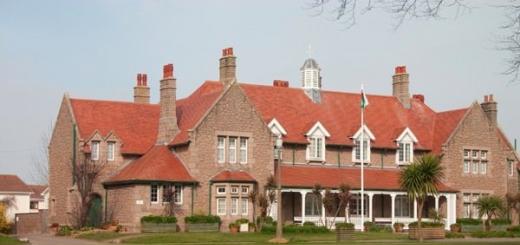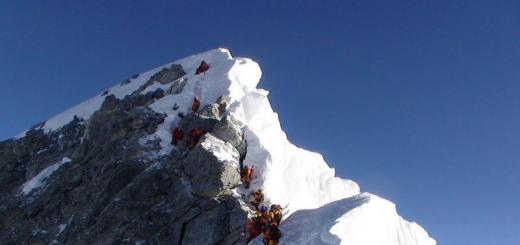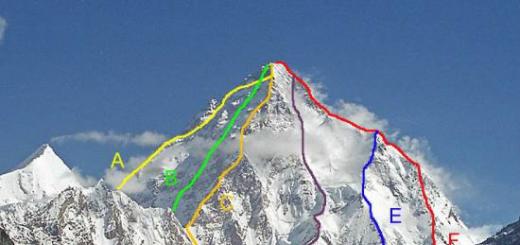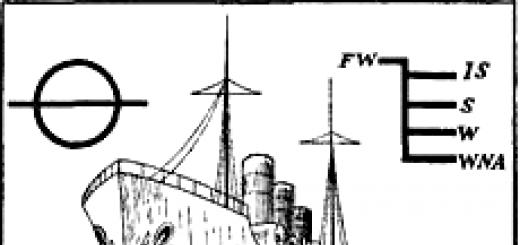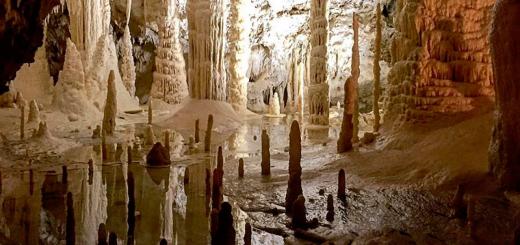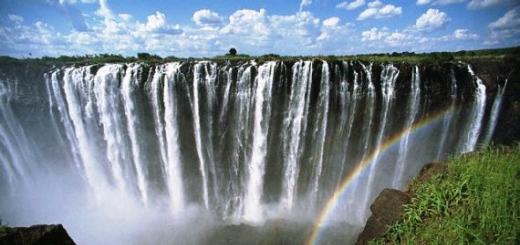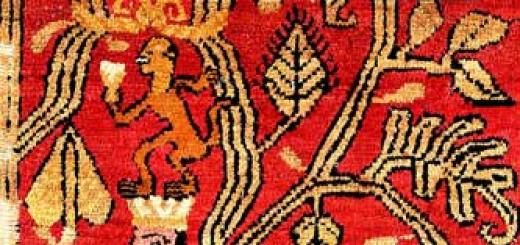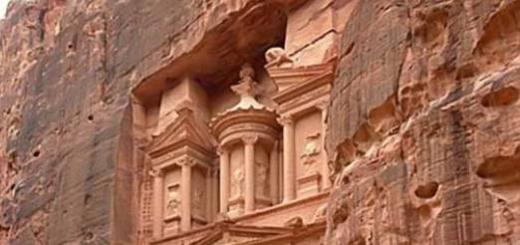A small mountain village is located in the south of the Republic of Adygea in the foothills of the Caucasus Range, on the territory of the Caucasus Nature Reserve. Guzeripl is famous for its pristine nature and the famous dolmen.
The village of Guzeripl, located in a remote corner of Adygea, is of historical and natural value. Guzeripl itself was founded at the beginning of the 20th century as a cordon of the Caucasian Nature Reserve. A little later, it became part of the Khamyshinsky rural district as a logging village.
The Adyghe pronunciation of the village is “gozaripl”, which means “observant”. Essentially this is true, since the village is the most remote settlement at the foot of the Caucasus Mountains, and is located like a guard on the way to the beautiful and densely populated valley of the Belaya River. The village was built at an altitude of six hundred and seventy meters above sea level, among high mountain peaks covered with fir forests. Healing mountain air, crystal pure water Belaya River, amazing caucasian nature have made the former logging village a desirable vacation spot and tourist destination. Guzeripl is surrounded by high mountain ranges on all sides, this creates a special microclimate in this valley.

Behind the bridge across the Belaya located in the village, the lands of the Caucasian Biosphere Reserve begin; there is a cordon through which you can enter its territory. In the reserve you can visit a museum dedicated to the nature of the Caucasus and the history of restoration of the Caucasian bison population, go on an excursion to the Molchele River, see the largest dolmen preserved on the lands of Adygea and a monument to mass grave soldier defenders of Guzeripl. The attractions of Guzeripl rightfully include the old railway, which is the starting point of the most famous tourist route. Every year, an international rafting competition, the Belaya Interrally, starts from the village.

The population of the village is very small, according to the official census it is about 100 people. This settlement comes to life with the arrival of tourists, who are very numerous here. Currently, Guzeripl is a rapidly developing tourist centre. The village has all the prerequisites to become an excellent tourist center in the Caucasus in the near future. Tourist complexes are constantly being built in Guzerple. The village has various hotels, equipped to suit every taste. Fans of “wild recreation” can always set up camp in any place they like. The area in front of the village is especially popular among tourists, where tent camps are constantly located in the summer. There is a good asphalt road leading to the village from Maykop.
The village of Guzeripl borders the Caucasian Biosphere Reserve, which can be accessed through a bridge in the center of the village. Its main attraction is the Museum of Nature of the Caucasian Nature Reserve. Walking along the road from the bridge over the river to the museum, you can admire the fascinating artificial waterfall of the Molchepy River, which flows from the dam of a small hydroelectric power station. The area adjacent to the museum is a protected area. Not far from the building itself there is a dolmen; in Adygea it is impossible to find an analogue to it in size and state of preservation.

During Patriotic War In 1942, fierce battles took place in this territory, as evidenced by the mass grave of the soldiers who defended the Caucasus - the riflemen of the 379th Mountain Rifle Regiment. The museum itself was founded about 60 years ago and occupies several halls. They tell about the history of the creation of the reserve, and the flora and fauna are widely represented. The museum displays voluminous exhibits – stuffed animals. They are collected into biological groups presented in their natural habitat. High-quality photographs, panoramas, and original exhibitions help visitors get acquainted with amazing nature this region. The museum warmly welcomes its visitors without breaks or weekends.

The path to the museum lies through the post of the biosphere reserve, located on the left bank of the Belaya. Entrance to the Museum of Nature is paid. From the bridge over the river to the museum you need to walk about three hundred meters along the road.
On the right and left banks of the Belaya River, on the territory of the Caucasian Biosphere Reserve and in the clearing of tourist gatherings, there are the remains of the dolmen of the village of Guzeripl. This archeological monument of the 1st-2nd millennium BC is one of the largest composite, well-preserved dolmens in the south of Russia. It is impossible to find an analogue to it in size and preservation in Adygea. It is huge, massive and mysterious.

Amazing with its engineering solution, labor-intensive nature, and sophisticated, at first glance, rough architecture, the megalith remains a mystery even today. Many scientists believe, and this is the main version, that dolmens are funerary megalithic structures of the Early and Middle Bronze Ages. Another popular theory is that elderly people went to die in them. There, in complete darkness and silence, they prayed and waited for death. Another group of scientists believes that dolmens, together with the pyramids, are part of the general planetary structure. The points where they stand were chosen deliberately. Dolmens are unique conductors that connect the earth with the information cosmic matrix, which ensures the development of all forms of life on Earth.
The attractions of Guzeripl rightfully include the old railway. In pre-war times, in the settlement itself there were two camps with convicts: general and strict regime; it housed repressed Don Cossacks, who for a time were engaged in logging and shipping timber. A narrow-line railway, 3 kilometers long, was located behind the village cemetery. They transported timber on a horse-drawn cart and a motorized locomotive. After this, the wood was floated down the Belaya mountain river. The war began, the zones were closed. A cordon of the Caucasian Nature Reserve “Suvorovsky” is located in residential buildings.

After the end of the war, it was from the end of the old railway that the path of the famous tourist route of All-Union significance began. It ran to the Partisan Valley, to the Fisht shelter and had access to the Black Sea coast. Now it is the most famous and popular a tourist route. You can get to Partizanskaya Polyana both by vehicle and on foot.

Climbing up, you can admire the amazing nature and enjoy the clean mountain air. The combination of picturesque nature with turbulent rivers, historical past, modern tourism makes the village attractive for visiting not only professional tourists, but also lovers of family holidays. And the old Railway is the starting point of the most famous route.
In order to explore the valley of the Belaya River there are several panoramic points that represent a special attraction of the village of Guzeripl.

The small observation deck is located in the center of the village, on the Black Rock. The rock faces south with black coal shale and has a fairly wide flat area with tall slender pine trees. From here you can see the eastern part of the village. A little higher than this place there is Bolshaya Observation deck. From the very peak of the rocky ridge it opens great view to the southern and central part of the village. A safe path leads to this point from the Small Platform to the rocks shaped like a rooster's comb.

The third observation deck is located on the southern slope of Mount Cossack. There is a wide path leading up there and overlooking rock formations. From the rocky shelves there is a view of the mountains Abago, Atamazhi and the village of Guzeripl. From this place you can admire not only the beauty of the village, but also the splendor of the mountains, breathe in the cleanest air, and recharge with cosmic energy. On the territory of the reserve, on the slope of Mount Filimonova, there is another vantage point from which you can observe the beauty of nature untouched by man. Compared to other observation points, it is rarely visited by tourists.
What makes it especially popular among tourists? What attractions of Guzeripl are worth visiting? We will answer these questions further.
Adygea: Guzeripl village
Guzeripl is a small village in the Republic of Adygea. It is part of Russia and surrounds it on all sides Krasnodar region. The climate here is moderate, pleasant, and the nature is rich in forests and rivers (Adygea is crossed by about 5 thousand rivers).
Guzeripl is located in the Maikop region of the republic, on the Belaya River. Guzeripl is located very close to the village and is surrounded by mountain ranges, so a favorable climate has formed here.
The village is small, a little more than a hundred people live in it. But clean mountain air, coniferous forests and wild rivers attract many tourists who truly appreciate the natural attractions of Guzeripl. People come to these places to improve their health and be alone with themselves and nature, to take a break from noisy cities and endless bustle.
Sights of Guzeripl: Partisan glade
Guzeripl appeared in 1924 as a village for lumberjacks. Two camps housed prisoners who were engaged in logging. During the war, the logging camps were closed, and after the end of hostilities, the All-Union tourist route was opened from Guzeripl. It ended at the Fisht shelter.
The Soviet route is still popular today. The path leads through the Partizanskaya glade, which is located near the Stone Sea ridge. here is more than 1500 meters.
The partisan headquarters in the clearing was located during the Civil War. During the Great Patriotic War, Adyghe partisans continued this tradition. Near the described place there is a ski resort. For backpackers Partisan glade is an intermediate point for climbing Fisht, Pshekho-Su and Guzeripl Pass.

Other attractions
On both sides of the Belaya River there are dolmens - religious buildings - evidence that life existed in these parts thousands of years ago. Behind the village cemetery there is an old railway, which has historical value. It was built to deliver timber to the river; its length was about three kilometers; then the timber was floated on the water.
In the Museum of the Caucasus Reserve you can learn more about the animal and flora protected area. The museum dates back more than 60 years. There are stuffed animals, photographs, and exhibits telling the history of the reserve's founding.
The remaining attractions of Guzeripl are of a natural nature. There are several points in the valley that offer excellent views. From the Small observation deck on the Black Rock you can admire the eastern part of Guzeripl. From here you can follow the path to the Big Observation Deck, where the southern and central parts of the village are clearly visible. An equally picturesque view of natural landscapes opens from the slope of Mount Filimonov.

At the beginning of May, the “Interalli - White” competition for amateurs will be organized in Guzeripl active rest. Here they carry out rafting, kayaking and canoeing, and going down the river on catamarans. At the same time, the festival of original songs “Primrose” is taking place at Partizanskaya Polyana.
Every tourist, going on a trip, prepares for himself a list of attractions in Guzeripl that are a must-see. Some plan independent ways to get acquainted with the city, others choose special walking or bus routes. tourism programs. Usually they cover the main attractions of Guzeripl and introduce tourists to the historical and cultural heritage of the city.
Art lovers first look for sculptural attractions on the map of Guzeripl. In the main squares of the city you can often see traditional monuments, against which guests of the city pose. But in popular park ensembles You can visit exhibitions of modern sculptures and installations. They can be made from the most unexpected materials and have unimaginable shapes that you will have to think about.
Religious buildings play a special role in the list of main attractions of Guzeripl. They form the architectural appearance of the Russian city, most of them contain important historical secrets. In Guzeriplo and beyond, you can go to the famous monastery complexes, admire the beauty of the iconic Orthodox churches or look into the cozy and small chapels that are so popular among the city's residents.
While traveling around the area, you can also see unusual religious attractions. These can be national religious buildings, ancient religious buildings, or generally mystical ritual places. Within Guzeripl you can see the following: Trinity-St. George Convent, Cross Men's Hermitage in Lower Solokh-Aul, St. Michael the Athos Monastery, St. Michael's Monastery.
While traveling, it’s nice to take walks along Guzeripl. You can purchase a map of Guzeripl with attractions and routes in advance, or even go in any direction. Then it will be even more exciting. Let yourself get lost in ancient alleys or spend time in parks. And if you get tired, you can have a snack or drink coffee in a cozy cafeteria. By the way, in Guzeripl there are several famous places, which every guest of the city wants to visit.
If you want to get the most complete picture of the city and its history, welcome to the museum institutions of Guzeripl. They contain extensive exhibitions on folk studies, art, folk arts and crafts, from archaeological excavations. Traditionally, such attractions are concentrated in the center.
However, thematic museums located in open spaces can often be visited outside the city. They offer visitors to watch entertaining showrooms telling about national traditions and folk art. These can also be installations of ancient cities or protective bastions. Such sights of Guzeripl will be interesting for children.
For family tourists, the question constantly arises: where to go with children. The most popular option is to go to one of the Guzeriplya aqua complexes. Most often, bonuses are offered when purchasing a family day pass.
If you are traveling in winter or spring, we recommend that you consider active leisure ski resorts Guzeriplya. There is a lot of entertainment for children and adults: a variety of trails for skiing alpine skiing, snowboarding, cheesecake skiing, exciting fun parks for the pros. Often such resorts are located at a not very large distance from the city, for example: Gornaya Karusel, Gazprom-Laura (ski resort), Krasnaya Polyana (ski resort), Alpika-Service, Ski resort Dombay. In this regard, it is more convenient to get there by personal vehicle or rent a car.
A great option for a family weekend is an outing into nature. Such attractions are located near Guzeripl. These can be ponds, caves, famous nature reserves. You just need to choose a place: Mzymta, Dakhovskaya Cave, Khadzhokhskaya Gorge, Firsova Glade, Bell Tower Rock, Vorontsovskaya Cave, Bolshaya Chura Mountain, Fisht Mountain, Rufabgo, Fisht-Oshtenovsky Pass. You can get to these corners of nature both on your own and by public transport. Check the schedule in advance shuttle buses, starting from city bus stations in the direction that suits you. On such a trip you will get a lot of vivid emotions from being in nature, and you will put your mind and body in order.
If you are visiting the city for business purposes, then you have little time for full excursions. In such circumstances, it would be a good idea to choose a condensed guide to the sights of Guzeriplu with photos and descriptions.
You can look for it at any time after arriving in the city at railway stations or at the airport. There is a list of the most popular places, where to go in Guzeripl, with names and photos of attractions. Isn’t it true, this greatly simplifies the question of what to see in Guzeriplo, if you have little time.
However, if the guidebook presents the most visited places in Guzeripl, then on the Internet you can find a list of “unpromoted”, but no less interesting attractions with reviews from tourists who visited them. Abandoned adits, mysterious craters, unusual railway tracks, bridges - such attractions attract adventure lovers.
When planning a trip to Guzeripl, it is worth getting information not only about the sights, but also about other important city sites. To make it easier to move around the city, you should have an idea of your routes. public transport, location of railway and bus stations or ports, metro stations. At the same time, these large transport hubs of Guzeripl can also attract the attention of travelers. Often they are the ones who form the first impression of a locality for a visitor.
Lovely little one Adygea perfect for those who like a calm, measured camping, for those who love to eat delicious food and have a weakness for Caucasian cuisine and for those who love leisure, that is, endless descents and ascents both in the mountains and along rivers. In my opinion, in addition to the capital Maykop, as well as several monasteries and dolmens, special architectural attractions in Adygea You will not find, despite its rich and ancient history. Adygea- This is one big natural attraction. There are about five thousand rivers alone in its small territory. I think that there are even more mountains with beautiful passes here than settlements. Therefore, lovers of mesmerizing landscapes, go to Adygea!
For example, in the foothills of the Caucasus Range there is a small Guzeripl village, recreation in which you will remember for the rest of your life. Believe me, upon your return you will be bragging about the photographs to your colleagues for a long time and repeating “unimaginable beauty”, “breathtaking” and simply “wow” many times. Guzeripl- this is not a fabulous medieval mountain village, but a harsh village of lumberjacks that arose already in Soviet times. Even its name, translated from the Adyghe language, is similar to the Russian phrase “observation point.” Wow, it gives me goosebumps... before the Great Patriotic War, there were camps for maximum security prisoners and several large logging sites where prisoners worked. In memory of this long past I stayed here Glade Prisoner. Another large clearing is called Partisan, its history is already connected with the period of the Great Patriotic War. They say that Guzeripl- the only stronghold that the Germans failed to capture. In the post-war years, a cordon was located here Caucasian Biosphere Reserve. Today Guzeripl village is actively developing as a tourist destination mountainous Adygea.
Getting to Guzeripl is not difficult.
Comes here regularly bus from Maykop, which is about eighty kilometers away. From the Maykop ticket office, on the street. Gogolya, 47, the bus to Guzeripl leaves daily at 6:50 and 16:30, the travel time (with all stops) is quite long - 2.5-3 hours, because Guzeripl is the last point on the busy tourist route.
Can be reached to Guzeripl from just on foot (this is just for lovers of active recreation), along the P254 highway through villages Dakhovskaya, Nickel and Hamyshki. This is about 50 kilometers, that is, 10 hours at average speed.
Now a little about placement in Guzeriple. Hotels they’re not cheap here, let’s just say right away, but they are available guest houses, camp sites and many forests where you can simply break camping. Almost all Guzeriplya hotels are located on the same street, so if you don’t book in advance, you can simply move from hotel to hotel in search of available rooms.
So, descending prices hotels Guzeriplya:
Guest house "Chalet Voyage", st. Lesnaya, 23, from 2700 rub./double room
Hotel « White River» , st. Lesnaya, 41M, from 2700 rub./double room with breakfast
Hotel "Mountain Air", st. Polevaya, 3, from 2500 rub./double room
Hotel Abago, st. Lesnaya, 49G, from 2500 rub./double room with breakfast
Hotel "Guzeripl", st. Lesnaya, 23, from 2500 rub./double room with breakfast
Guest house "Eden", st. Lesnaya, 47Zh, from 2700 rub./double room with breakfast
Recreation center "Wolf House", st. Lesnaya, 23, from 2100 rub./double room
Hotel complex "Enektur", st. Lesnaya, 38, from 2000 rub./double room with breakfast
Guest house "Ozon family", st. Lesnaya, 4B, from 2000 rub./double room with breakfast
Guest house "VidGor", st. “Lesnaya”, 49, from 2000 rub./double room with breakfast
Recreation center "Partisanskaya Polyana", 15 km from the village, from 1400 rub./double occupancy
Guest house "Valentina, st. Lesnaya, 26, from 1000 rub./double occupancy
And now about the most interesting thing, about what to see in Guzeripl and take photos to the envy of your colleagues in distant, stuffy offices.
Dolmen of Guzeriplya and the Museum of Nature of the Caucasian Reserve




On the right side Belaya River, if you cross the bridge from the village, there is a ranger cordon. You will not be allowed into the territory of the Caucasian Nature Reserve without permission and accompaniment, but almost immediately at the cordon you can find two local attractions: the oldest and the highest dolmen of Adygea and the local Museum of Nature.
The museum is open to visitors all year round, seven days a week from 10:00 to 17:00 (lunch from 13:00 to 14:00), on Mondays and Tuesdays - from 14:00 to 17:00.
The museum was opened in 1956 and has not changed much since then. Here you can learn about the flora and fauna of those regions, as well as the milestones in the formation of the museum itself. Therefore, you should not devote a lot of time to inspecting it. But it really is very close interesting artifact — Dolmen of Guzeriplya. Between two huge pine trees, or rather between their roots, there is a stone hut without windows, without doors, with a small hole on the front wall. Scientists have still not come to a definite conclusion whether dolmens were religious or funerary structures. To this day, dolmens are surrounded by many legends. The most common legend is that they were built by none other than giants, because it is difficult to imagine that an ordinary person or even a group of people could lift such thick and heavy slabs. Is no exception dolmen in Guzeripl, because it is the largest and oldest in Adygea. Its creation dates back to the 2nd millennium BC, which means that it is older than some Egyptian pyramids! They say that you can whisper a wish into its hole, and it will certainly come true thanks to the ancient spirits living inside.
Old railway, Zholobnaya river and waterfall


Just behind the churchyard Guzeripl village, on the right bank Zholobnaya River, you can find an old railway track stretching into the distance for about three kilometers. Today, only this short narrow-gauge railway line reminds of the sad past of the village at the very beginning of its history. It was along this road that timber was transported from the prison camp for further rafting along Belaya River to. Now it is a tourist site, picturesquely covered with mosses. Part of it passes directly under the overhanging rock. This road will lead you to waterfall on the Zholobnaya River.
The Zholobnaya River carries its waters along with melted snow and mountain grasses directly from Lago-Naki plateau and here, as if slowly, it falls into a deep stone bowl, overgrown with dense moss on all sides. An amazingly peaceful and mesmerizing sight. From here, from the quiet green thicket, you can see Stone Sea ridge, protruding with its chest above the fir forest. This gray-haired stone giant is the highest point of the ridge - Nagoy-Kosh rock.
Partisan glade



Partisan glade is located approximately 14-15 kilometers west of Guzeripl. You can get there along a good asphalt road that starts from the mouth of the Zhelobnaya River. The clearing received its name due to the fact that during the Civil and Great Patriotic Wars, here, on a flat, high and inconspicuous place, there was a local partisan base, from which it was very convenient to make forays in different directions. Right here local residents kept their cattle, hiding them from enemies. Experienced instructors say that this place became truly famous and touristic only after a tourist center was built here. Before that, find a way out to the clearing independent tourists, who did not know the area, it was very difficult, because the clearing is located under steep dolomite walls 80 meters high. Now Partisan glade is more of a transit point for those who travel to the side Stone Sea Ridge, To Fisht mountains, Pshekho-Su or at Guzeripl Pass. It is located at an altitude of approximately 1500 meters above sea level and offers beautiful views of the endless Caucasian mountain ranges and their peaks.
Yavorovaya Polyana



A little further west and a little higher, 6 kilometers from Partisan glade, exactly where the asphalt roads end, is located Yavorovaya Polyana, so named because of the dense thickets of the unique perennial sycamore maple. It cannot be said that this glade is something else unique. Another transit point for those heading to the mountains, another observation deck for those taking a leisurely walk in the vicinity of the village of Guzeripl.
From Moscow
By car.
Along the M4 highway. Distance 1479 km. Travel time – 17.34 hours.
By plane.
From Domodedovo, Vnukovo or Sheremetyevo airports, flights to Krasnodar. Then you can use a taxi (the distance to Maykop is 127 km, to Guzeripl - 203 km). From the Krasnodar bus station to the capital of Adygea can be reached by bus. Travel time is 2.40-3.00 hours. And from Maykop to Guzeripl - also by bus (one trip per day). Travel time is about 2.00 hours.
On a long distance train.
From Kursk, Kazan and Paveletsky railway stations by train to Krasnodar or Belorechensk. Travel time from 19.27 h to 33.00 h. From Krasnodar by bus - to Maikop. And from Maykop to Guzeripl - also by bus. Travel time is about 2.00 hours.
And from Belorechensk (railway station "Belorecherskaya") - on commuter train to the station "Khadzhokh" (one train per day). From Khadzhokh (village Kamennomostsky) to Guzeripl (46 km) you can take a bus or taxi.
Walk around Guzeripl and surroundings
You should start your walk around Guzeripl by visiting the cordon of the Caucasian Nature Reserve. The protected area begins right in the village, behind the bridge over the Belaya River. Just over 100 people live in the village itself. Recently, it has been actively developing as a tourist center, new guest houses and other infrastructure are being created.
On the right bank of the Belaya, about 300 m from the bridge, rangers live on the cordon and there is a Museum of Nature of the Caucasian Reserve, dedicated to the local fauna and flora, as well as the history of the restoration of the bison population. Since 1979, this protected area has biosphere status and is part of the international system of Earth biosphere reserves. And since 1999, the reserve’s lands have been included in the UNESCO list World Heritage. The museum is open to visitors from 10.00 to 17.00 (with a break from 13.00 to 14.00). And on Mondays and Tuesdays - from 14.00 to 17.00.
Museum of Nature of the Caucasian Reserve
Not far from the museum stands one of the best-preserved large Adyghe dolmens, the height of which reaches 2.5 m. The age of this megalithic structure, made of large slabs of sandstone, exceeded 4.5 thousand years.
In addition, on the right bank of the river. In Belaya, you can visit the monument at the mass grave of the soldiers who defended the village during the Great Patriotic War. It is also interesting to look at the wide artificial waterfall on the dam of an old small hydroelectric power station, which supplies Guzeripl with electricity. It is located on the right tributary of the Belaya – the Molchepe River.
The uninhabited territories of the spurs of the Caucasus Range begin from Guzeripl. Mountain gorges surround the village on all sides. From the south, at a distance of about 10 km, rises Abago pasture. The route to it is laid from the mouth of the river. Silent. To climb up alpine meadows Abago, you need to get permission from the staff of the Caucasian Nature Reserve.

Mount Abago
On the Guzeripl river itself. Belaya receives a large left tributary – the Zhelobnaya River. From its mouth, an asphalt road leads to the west, gaining altitude to the Partizanskaya Polyana camp site and above it - under the peaks of the Lagonaki mountain plateau. It was laid relatively recently to Yavorova Polyana, from where tourist groups follow the trail to the Fisht shelter.
Previously, along the right side of the Zhelobnaya valley there was a narrow-gauge railway, along which timber was delivered down to Guzeripl from logging sites on the mountain slopes. Prisoners worked here, including repressed Don Cossacks. From the village the timber was rafted along the Belaya to Kamennomostsky. To walk to the location of the former lumberjack camp in the Zaklyuchenka clearing, you must also obtain permission from the administration of the Caucasian Nature Reserve.
Partisan glade lies at an altitude of about 1600 m near a mountain stocked lake. It is 18 km away from Guzeripl and got its name from the partisan base that was here during the civil war. During the Great Patriotic War, livestock collected from the Lagonaki Plateau were hidden from the invaders in this clearing. There is a camp site here, and there is a 0.4 km mountain slope convenient for skiing. You can get here on foot or by taxi.

Lake near Partizanskaya Polyana
The gutter flows down from a beautiful mountain Stone Sea ridge, encircling the high-mountain meadows of the Lagonaki plateau from the east. These places, replete with karst sinkholes and cavities, are very popular among speleologists. Highest point ridge is rock Nagoy-Kosh, ending towards Guzeripl with a light gray wall of limestone.

Ridge Stone Sea
Yavorovaya Polyana located 6 km to the west from Partizanskaya. It is located near the Armenian River, at an altitude of 1575 m. The asphalt road ends here. The name was given to the clearing because of the broad-leaved maple tree growing here - sycamore.

Yavorovaya Polyana
And you can complete your walk around the outskirts of the village of Guzeripl by climbing the trail to Guzeripl Pass, which is located between the nameless peak and the spur of Mount Otshen. The path to it from Yavorova Polyana lies through the Armenian Shelter. This route, called “Po Western Caucasus”, was very popular in previous years. From the Guzeripl pass, tourists can go to another pass - the Armenian one, then to the Fisht shelter, and through the Belorechensky and Cherkessky passes to descend to Babuk-Aul.

Guzeripl Pass


